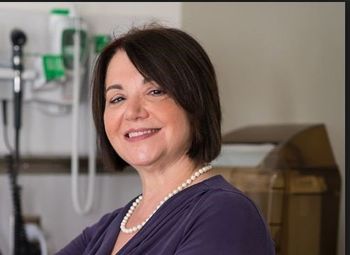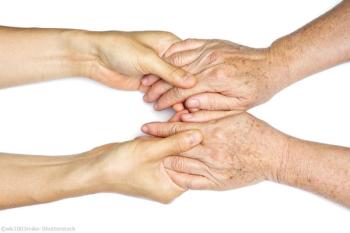
Caring for the Family Caregiver: Tools and Training for Healthcare Professionals
Two of every three families in the US will at some time have at least one family member diagnosed with cancer, and family caregivers provide more than 75% of cancer care. Demands on family caregivers are increasing in complexity and duration.
Two of every three families in the US will at some time have at least one family member diagnosed with cancer, and family caregivers provide more than 75% of cancer care. Demands on family caregivers are increasing in complexity and duration, with trends toward earlier patient discharge from acute-care hospitals, declining reimbursement of hospital and home-care services, and advances in cancer treatment changing the landscape of family involvement in patient care.
A family caregiver is any person (friend or kin) who is providing uncompensated care to a person with whom s/he has a pre-existing relationship. According to the medical literature, family caregiver distress is often at least as high as the level of distress experienced by the patient, and sometimes it is higher. Because cancer tends to strike at an advanced age, family caregivers (such as spouses, siblings) are often elderly, with comorbidities (arthritis, high blood pressure, etc) and physical frailty. Clearly, this can add to the challenge of the caregiver role.
Alleviation of caregiver stress is critical to improve the quality of life and quality of care for family caregivers, but it is an area of support that to date has received only limited attention.
During the 37th annual Oncology Nursing Society Congress (May 3–6, 2012), a project to address family caregiver needs was presented as a poster, “Evaluation of a Supporting Oncology Family Caregiver Course for Healthcare Professionals” (abstract 1337348). It is a led by researchers from City of Hope, Duarte, California, and aims to educate healthcare providers about how to best support family caregivers of patients with cancer, across physical, psychological, social, and spiritual domains. The project principal investigator is Betty Ferrell, PhD, FAAN, FPCN, Professor, Nursing Research and Education. Marcia Grant, RN, DNSc, FAAN, Director and Professor, Nursing Research and Education, is the co-PI. Jo Hanson, RN, MSN, CNS, OCN, Senior Research Specialist, Nursing Research and Education, is the project director. The project is supported by a training grant from the National Cancer Institute (NCI grant 1R25CA132 664-01A2).
The purpose of this 5-year project (2010–2015), interim results of which were discussed by Ms. Hanson during a poster session at ONS Congress, is to help 400 healthcare staff at 200 cancer centers across the US better understand and address family caregivers’ special needs, so they can develop support programs and interventions in their own institutions targeting family caregivers.
Four annual courses, involving a 3-day intensive training and 2-person interdisciplinary teams, are offered to competitively selected healthcare providers from cancer centers across the US. The curriculum content is based on the
Day 1 covered challenges for family caregivers in the pediatric, adult, and geriatric care settings, as well as family communication overall. Breakout sessions focused on sexuality concerns, diversity in family caregiver communities, spousal caregiving, and distance caregiving. Film clips highlighting roles and communication in family caregiving were included.
Day 2 covered, through state-of-the science lectures, physical, psychological, and social well being assessment and screening for pediatric, adult, and older adult populations, and included time for team goals-setting.
Day 3 covered, through a state-of-the-science lecture, spiritual well being, with discussions about deriving meaning and faith in caregiving. Models of excellence in supporting spiritual well being were described.
A total of 235 participants (44% nurses, 39% social workers) in 111 teams from 34 states attended the first two courses (2011) in Anaheim, California. About two-thirds (65%) were from community cancer centers and the remainder (29%) worked mainly at NCI comprehensive cancer centers. During the course, each team was required to develop three goals related to implementation and dissemination of the course content and resources. Goal evaluation and follow-up was conducted at 6, 12, and 18 months.
A total of 333 team goals were identified in the first two courses of this project. The most common goal was to develop or enhance support and education groups for family caregivers. Other goals included development of a handbook, brochure, or toolbox to support family caregivers; adding a resource area for family caregivers to the institution’s website; developing a needs assessment to evaluate and address specific family caregiver needs; identifying existing resources and partnering with outside community resources; and several additional initiatives.
Overall course evaluations were positive (average score, 4.73 of 5). With a 100% response rate for the 6-month follow-up, the first course participants reported completion of 47% of their goals, with the remaining 53% in process or modified.
The courses helped the healthcare participants to identify and disseminate information about community and other resources that can provide emotional, psychological, and practical support specifically for family caregivers. Examples mentioned by Ms. Hanson in her poster discussion include cancer support groups in the community and through CancerCare; other reliable online resources that offer free materials for caregivers, such as the websites of the
The researchers emphasized that heightened interdisciplinary sensitivity to the many facets of the family caregiver experience is essential across the healthcare team, as it facilitates better communication with families and improved intervention on their behalf.
Although many institutions welcome family caregivers as well as patients in their support programs-including nutrition classes and yoga and other integrative medicine programs, caregivers often are not aware that these benefits are also available to them, so this is an important area of communication between healthcare providers and family caregivers, Ms. Hanson said.
Individual institutions are beginning to address the acute and longer-term needs of family caregivers. For example, said Ms. Hanson, The University of California at San Francisco offers a
The remaining
Newsletter
Stay up to date on recent advances in the multidisciplinary approach to cancer.














































